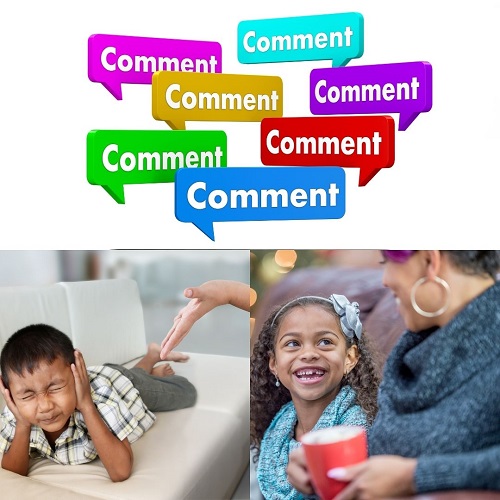Critical Comments Flow Freely from Parents
by Kathy Slattengren, M. Ed., Priceless Parenting (sign up for monthly parenting newsletter and receive 20+ printable charts for kids and parents)

Do you make more positive comments or negative comments to your children on a typical day? If you are like many parents, you make a lot more negative comments than positive ones. You may not even realize how often you are doing it.
Misbehavior quickly catches your attention. This fits with the negativity bias. The negativity bias is the tendency to notice negative behavior more easily and to dwell on it. This means it is easier to see your kids' poor behavior than their good behavior.
Criticizing Kids
What do you do when your kids' behavior is outside your expectations? Isn't it your job to point out what your kids are doing wrong so that they can improve their behavior?
While you do want to provide guidance, continually criticizing them eventually leads to them tuning you out. Blocking you out protects them from the emotional pain. Continually hearing negative comments also develops that critical voice inside their own heads.
Critical comments make your kids feel bad about themselves. These comments often focus on what your child is doing wrong without providing direction on what to do instead. Here are some examples:
- "Stop whining!"
- "Don't look at me that way."
- "You're wasting time."
- "Quit your fighting!"
- "Don't lie to me."
- "Can't you see I'm busy?"
- "You leave your dirty clothes all over the place."
- "How many times do I have to ask you?"
- "Why can't you behave?"
- "Your room is a mess."
- "You are a brat!"
- "What's wrong with you?"
- "You'll never get anywhere in life with that attitude."
How do you feel after reading through these comments? A regular diet of criticism is toxic to relationships. To have the loving relationships you want with your kids, you need to be saying more positive than negative statements.
Getting More of What You Focus On
Whenever you find yourself yelling at your kids or nagging them, you are focusing on the behavior you don't want. By giving attention to misbehavior, you unintentionally increase the chance that the misbehavior will be repeated. This isn't what you want!
One example comes from a mom who was complaining about how her 2-year-old son was driving her crazy with his screaming. Whenever he was frustrated, he would scream at the top of his lungs. Usually she would stop whatever she was working on, go find him and help him resolve the problem. She found it especially irritating when she was busy preparing dinner and he kept interrupting her with his screaming.
After reflecting on the situation, she realized the attention she was giving him for his screaming was encouraging him to do it more often. This was the opposite of what she wanted! Her new plan was to periodically go find him when he wasn't screaming and compliment him on his behavior. She also decided to ignore his screams of frustration. This new approach worked far better!
Paying Attention to Good Behavior
Overcoming the negativity bias takes extra effort to notice what is going well. How often do you say something when your kids are behaving well? When is the last time you thanked them for being respectful or sharing a toy? It takes intention to notice their good behavior and point it out.
There are many ways to reward good behavior:
- A light touch on the shoulder, a quick back rub
- A smile, hug, or kiss
- Saying "Thank you."
- Kind words, words of encouragement
Statements like these acknowledge children's good behavior:
- "I noticed that you put away the puzzle after you were done playing with it. That was great."
- "I heard you practicing your trumpet. It's really sounding good."
- "I appreciated how you held my hand when we crossed that busy street."
- "Thanks for helping set the table."
- "I love how you're sharing the markers."
By pointing out your children's good behavior, you are encouraging it. You are also filling your home with more positive energy. Children crave attention. When they are not getting enough positive attention, they will go for negative attention. Ideally you are giving them so much positive attention that they don't need to misbehave to get your attention!